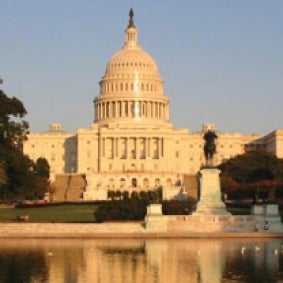Knauss legislative fellowships in Congress help build careers — and they're fun and educational. See our video and fact sheet for details.
Four Knauss Marine Policy Fellows Work in Washington in 2013

Maryland will support four Knauss Marine Policy Fellows in 2013 to work for federal agencies on issues involving marine and coastal resources. The fellows, all of whom studied at the University of Maryland, will focus on topics such as the Deepwater Horizon oil spill, fisheries, and international affairs.
Jennifer Bosch is spending her fellowship year in the Office of Laboratories and Cooperative Institutes at the National Oceanic and Atmospheric Administration (NOAA). She plans to collaborate with researchers and decision makers to help them create policies and other tools to solve environmental management issues.
As a doctoral student in marine ecology and environmental science at the University of Maryland, she has studied the biogeochemistry and ecological impacts of the Chesapeake Bay’s low-oxygen regions or “dead zones.” She is analyzing shifts in benthic invertebrate community structure and consequences for nutrient cycling processes.
Bosch grew up in New Jersey and developed an early love for the marine environment by spending every summer of her childhood at the Jersey shore. As an undergraduate and later a marine scientist at Rutgers University, she developed and ran a satellite data system about sea-surface temperatures that remains widely used by scientists and commercial and recreational fishers. As part of several public-outreach projects, she worked with middle-school students and teachers to encourage their interest and studies in marine science.
Nicole Bransome is the inaugural Knauss fellow for Department of the Interior’s Ocean, Coasts and Great Lakes Coordination team. As a policy and communications specialist, she will coordinate Interior’s work on oceans across the department’s bureaus and with federal partners.
Bransome is pursuing a master’s degree in the Marine Estuarine Environmental Sciences program at Maryland. She chose the fisheries area of study because it allowed her to use science to sustain fisheries and the ecosystems, economies, and food supplies they support. For her thesis, she is modeling restoration of diadromous river herring in Maine and the resultant potential recovery of their groundfish predators, like Atlantic cod.
Originally from Maryland, Bransome found a passion for marine science while volunteering with National Park biologists on studies of tidepools in San Diego. She also spent a year working for AmeriCorps in the Maryland Park Service, where she led canoe trips about marsh ecology and taught elementary-school children. At the Chesapeake Biological Laboratory, a part of the University of Maryland Center for Environmental Science, she led efforts to raise money for student research and served as president of the American Fisheries Society Student Subunit.
Carrie Soltanoff is serving in the National Marine Fisheries Service Office of International Affairs at NOAA. Her portfolio will include shark and Atlantic tuna conservation, bycatch reduction, and regulation of foreign fishing vessels. She will produce briefing materials and policy papers for meetings and negotiations on international issues.
Originally from upstate New York, Soltanoff completed a master of science degree in the Sustainable Development and Conservation Biology program at Maryland. During her graduate studies, Soltanoff carried out applied research projects for the World Wildlife Fund, Woods Hole Oceanographic Institution, and Rare Conservation.
She served as a Peace Corps volunteer for two years in Ecuador, where she conducted work for her thesis about shifting environmental baselines among fishermen -- the idea that each generation of fishermen has a distinct view of the current state of fish populations -- and the implications for management of a marine reserve. Soltanoff used her fluency in Spanish to interview the fishermen about their work for her research.
Metthea Yepsen is working in NOAA’s Restoration Center in the Office of Habitat Conservation as a policy and science coordinator on the office’s Deepwater Horizon oil spill restoration efforts. She will assist in ensuring that science and adaptive management are integrated into restoration initiatives.
Yepsen received an M.S. degree in environmental science and technology from Maryland with a focus on wetland ecology and restoration. For her thesis research, she worked on a U.S. Department of Agriculture project to evaluate the effectiveness of federal wetland conservation practices and restoration in agricultural areas. To measure ecosystem services provided by wetlands, she compared plant communities in natural, restored, and farmland sites in several Mid-Atlantic states, including Maryland.
“Our days spent slogging through mud surrounded by bald eagles, turtles, and highly adapted marsh species made me fall in love with coastal wetlands and the Chesapeake Bay,” Yepsen says.
Yepsen’s background is different from that of many Knauss Fellows. She completed a bachelor’s degree in the humanities, studying diplomatic history. Her career path changed when she joined AmeriCorps in Hawaii. There she performed conservation work in natural area reserves, attached sling loads to hovering helicopters, and climbed through sharp lava rock. Those experiences sparked an interest in a career in environmental science that led her to return to college to take post-baccalaureate science classes and then to study native and restored ecosystems in graduate school.
The Knauss Fellowship, begun in 1979, is designed to present outstanding graduate students with an opportunity to spend a year working with policy and science experts in Washington, D.C. The program, named for marine scientist and former NOAA Administrator John A. Knauss, is coordinated by NOAA's National Sea Grant Office.
Fellowships run from February 1 to January 31 and pay a yearly stipend plus an allowance for health insurance, moving, and travel. Applicants must apply through the Sea Grant program in their state.
For more information:
Maryland Sea Grant program, Knauss Fellowships
National Sea Grant program, Knauss Fellowships
-- Jeffrey Brainard



